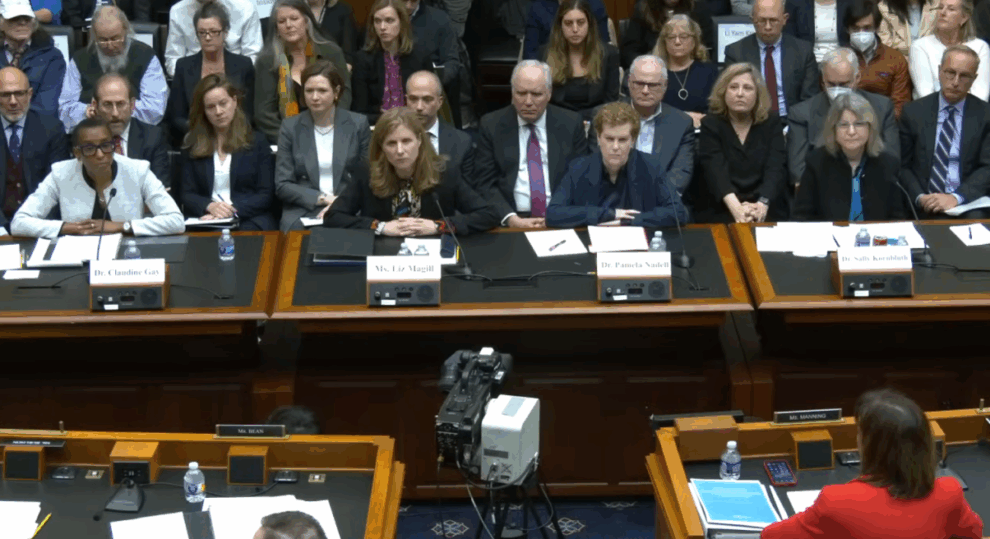Liz Magill said it was “context-dependent” whether calling for genocide of Jews violated Penn’s conduct code. Days later, she resigned. Now she’s landed fellowships at Yale and Harvard.
In a wide-ranging interview with Politico, Liz Magill, the former president of the University of Pennsylvania who resigned in the wake of devastating testimony during a House Education and Workforce Committee hearing on antisemitism on college campuses, discussed the aftermath of that hearing and the circumstances that led to her ouster.
During that hearing, according to Politico, New York Congresswoman Elise Stefanik’s question of “At Penn, does calling for the genocide of Jews violate Penn’s rules or code of conduct?” became the turning point, which the outlet claims “would blow up Magill’s presidency.”
Even before the horrific Oct. 7, 2023, terror attack by Hamas that murdered more than a thousand Israelis, antisemitism had become a concern on Penn’s campus. Local Jewish organizations wrote in September of that year to Magill asking the school to “distance itself” from a festival called “Palestine Writes.” The Philadelphia Jewish Federation argued antisemitic remarks in the past by scheduled speakers were disconcerting. While Magill’s initial reaction was muted, “the festival began to attract national attention” and criticism from national Jewish interest groups and even Penn alumni.
Marc Rowan, an alumnus of Penn’s Wharton School of Business, was apparently behind an effort to pressure the school to cancel the event, labeled by detractors as a “hate fest.” After the October 7 attacks, critics of Magill and the school’s handling of the festival organized to encourage donors and Penn alumni to stop donations until Magill and others resigned, saying the Palestine Writes festival was a “tragically prescient preview” of Oct. 7.
When asked by Stefanik about Penn’s code of conduct and calling for genocide of Jews during the Dec. 5 hearing, Magill told the magazine the immediate response from board members and others was positive. Yet just a few hours later, her answer, in which she said it was “context-dependent” on whether “calling for the genocide of Jews…constitute[s] bullying or harassment?”, was “blowing up” on social media. Politico framed Magill’s answer “accurate” but that in politics “technical accuracy can be the least important thing there is.”
The day after Jews were burned in the streets in America by a radical pro-Palestinian terrorist illegally in our country, @politico publishes a column about how former university President Liz Magill is the “first casualty” in the war against elite universities.
No. The…
— Rep. Elise Stefanik (@RepStefanik) June 2, 2025
Stefanik took exception with the framing of the Politico profile, criticizing it on X for characterizing Magill as the “first casualty” in the war against elite higher education. Instead, Stefanik says the real casualties are the American Jews burned or shot dead by terrorists.
Despite releasing a quasi-apology video for how she framed her answer to Stefanik’s questioning, the “storm” continued to rage. Less than a week after her appearance in front of Congress, Magill resigned her position as president of Penn.
In the year that ended in her resignation, The Daily Pennsylvanian reported Magill was paid nearly $2.5 million, more than double what she earned the previous year.
Since then, Magill has been appointed to fellowships at Yale’s Branford College and Harvard Law School.
Magill also recently took part in a public discussion with fellow ex-Penn employee, Board of Trustees Chair Scott Bok in which both considered whether antisemitism was a problem on Penn’s campus and defended their actions. Magill said Penn’s investigation into protests resulted in “some arrests” and helped “improve the climate for the long term.” The former Penn head said it was difficult to distinguish between “free speech and hate speech.”





